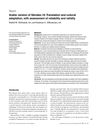TLDR The Polish Skindex-29 is a reliable and valid questionnaire for assessing the quality of life in Polish dermatology patients.
The study adapted the Skindex-29 questionnaire for Polish dermatology patients and involved 290 participants. It found that the Polish version had high reliability, with Cronbach's alpha coefficients ranging from high to very high for all indexes. The factor analysis suggested a four-factor structure, which was different from the original three-factor structure. The questionnaire was effective in distinguishing quality of life differences among various skin conditions and between in-patients and out-patients. Skin lesions on specific body parts, such as legs and anogenital areas, were significant predictors of lower quality of life. The study concluded that the Polish Skindex-29 is a reliable and valid tool for measuring dermatological quality of life, but suggested reconsideration of its factor structure.
158 citations
,
March 2011 in “Journal of the American Academy of Dermatology” Patients with cutaneous lupus erythematosus have a severely impaired quality of life, especially emotionally.
 45 citations
,
January 1999 in “Dermatology”
45 citations
,
January 1999 in “Dermatology” The VQ-Dermato is a reliable French questionnaire for measuring quality of life in chronic skin disorder patients.
158 citations
,
March 2011 in “Journal of the American Academy of Dermatology” Patients with cutaneous lupus erythematosus have a severely impaired quality of life, especially emotionally.
 17 citations
,
July 2017 in “International Journal of Behavioral Medicine”
17 citations
,
July 2017 in “International Journal of Behavioral Medicine” The Egyptian Arabic Skindex-16 is a reliable way to measure how skin diseases affect quality of life in Egyptian patients.
 July 2015 in “British Journal of Dermatology”
July 2015 in “British Journal of Dermatology” Treating skin conditions with both psychological and dermatological care improves patient outcomes and can save costs.
 24 citations
,
March 2007 in “International Journal of Dermatology”
24 citations
,
March 2007 in “International Journal of Dermatology” The Arabic Skindex-16 is a reliable and valid way to measure the impact of skin conditions on quality of life in Saudi patients.
 January 2017 in “Acta dermato-venereologica”
January 2017 in “Acta dermato-venereologica” The congress showed that psychological therapy can help skin condition patients, social media affects acne stigma, education improves atopic dermatitis, and patient satisfaction in dermatology is high, especially with good doctor engagement.





